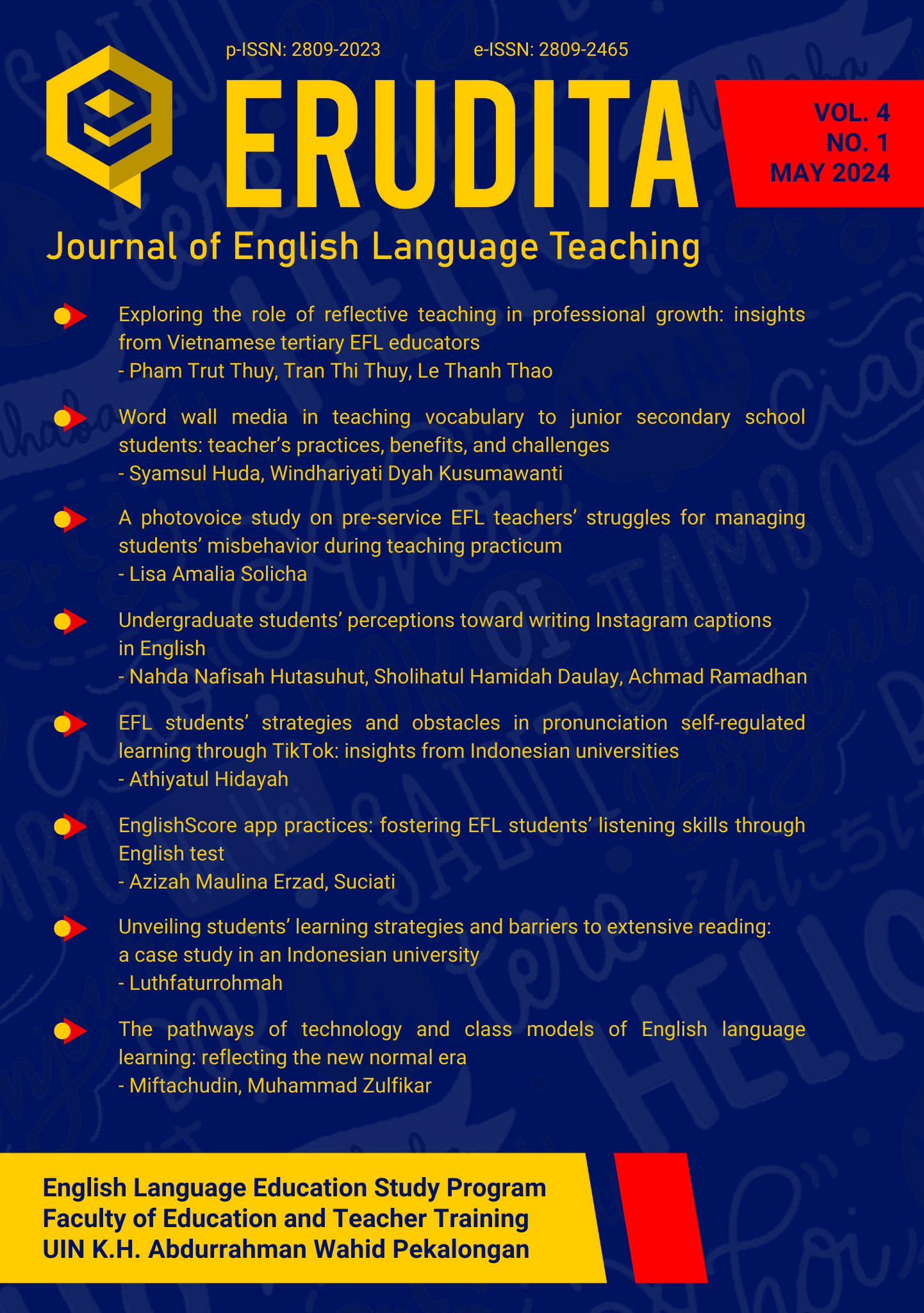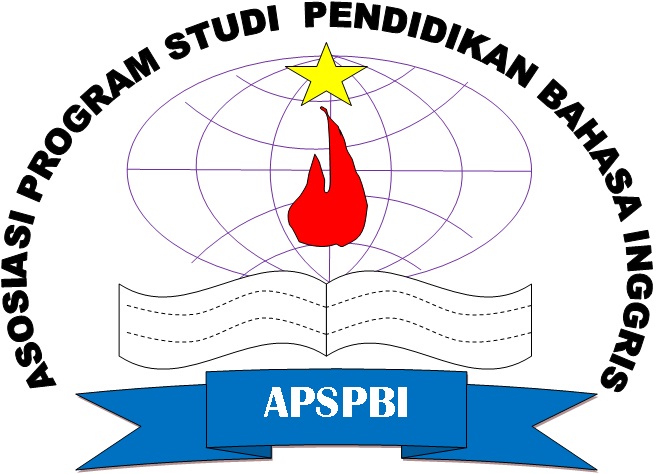A photovoice study on pre-service EFL teachers’ struggles for managing students’ misbehavior during teaching practicum
DOI:
https://doi.org/10.28918/erudita.v4i1.7693Keywords:
Photovoice, Pre-service EFL teachers, Students’ misbehavior, Teaching practicumAbstract
Despite classroom management has been widely investigated by previous studies, the issues of managing students’ misbehavior in EFL classes still receive scanty attention. This study aims to investigate the types of students’ misbehavior and pre-service EFL teachers’ struggles in managing students’ misbehavior during their teaching practicum in secondary schools. This research was designed as a photovoice study, and two pre-service EFL teachers were recruited to participate in this study. Their lived experiences in dealing with students’ misbehavior during a teaching practicum program were documented through photovoice. The data were analyzed employing thematic analysis. The study findings demonstrated three types of students’ misbehavior, i.e. socially disruptive behavior, authority-challenging behavior, and self-disruptive behavior. Another finding reported that pre-service teachers encountered several challenges in managing students’ misbehavior, in terms of managing hard-control students, maintaining students’ focus, managing students who made noise, and organizing students who broke classroom rules. This research concludes with empirical insights into how pre-service teachers encounter challenges addressing students’ misbehavior and how they require to use strategies to tackle students’ misbehavior, including giving punishments regarding the level of students’ misbehavior.
References
Abdullah, D. Y., & Basthomi, Y. (2020). Hear our voices: Pre-service English teachers’ challenges and expectations during teaching practice. Jurnal Pendidikan Humaniora, 8(1), 19–27. https://journal.um.ac.id/index.php/jph/article/view/13634
Braun, V., & Clarke, V. (2006). Using thematic analysis in psychology. Qualitative Research in Psychology, 3(2), 77–101. https://doi.org/10.1191/1478088706qp063oa
Brewster, J., Ellis, G., & Girard, D. (2002). The primary English teacher’s guide. Penguin English Guides.
Cameron, M. (2006). Managing school discipline and implications for school social workers: A review of the literature. Children & Schools, 28(4), 219–227. https://psycnet.apa.org/doi/10.1093/cs/28.4.219
Charles, C. M. (2014). Building classroom discipline (6th ed.). Longman
Debreli, E., & Ishanova, I. (2019). Foreign language classroom management: Types of student misbehaviour and strategies adapted by the teachers in handling disruptive behaviour. Cogent Education, 6(1), 1648629. https://doi.org/10.1080/2331186X.2019.1648629
Doyle, W. (2006). Academic work. Review of Educational Research, 53(2), 159–199. https://doi.org/10.3102/00346543053002159
Emmer, E. T., & Stough, L. M. (2003). Classroom management: A critical part of educational psychology, with implications for teacher education. Educational Psychology, 36(2), 103–112. https://psycnet.apa.org/doi/10.1207/S15326985EP3602_5
Garrett, T. (2014). Effective classroom management: The essentials. Teachers College Press.
Glock, S. (2017). Pre-service teachers’ responses to students’ misbehavior in the classroom depend on students’ ethnicity: A pilot study. Journal of Classroom Interaction, 52(2), 4–15. https://psycnet.apa.org/record/2018-10358-001
Jayadi, R. F., & Adi, S. S. (2022). Classroom management problems faced by pre-service teachers of English education program in senior high schools. EDUCAFL: Journal on Education of English as Foreign Language, 5(1), 20–27. https://doi.org/10.21776/ub.educafl.2022.005.01.03
Koca, S. (2016). The competency of pre-service classroom teachers’ regarding the learning-teaching process in a music course: Implementation from a Turkish university. Journal of Education and Practice, 7(33), 143–155. https://iiste.org/Journals/index.php/JEP/article/view/34140
Koltz, R. L., Odegard, M. A., Provost, K. B., Smith, T., & Kleist, D. (2010). Picture perfect: Using photo-voice to explore four doctoral students’ comprehensive examination experiences. Journal of Creativity in Mental Health, 5(4), 389–411. https://doi.org/10.1080/15401383.2010.527797
Langley, D. J. (2009). Student challenging behaviour and its impact on classroom culture: An investigation into how challenging behaviour can affect the learning culture in New Zealand primary schools [Master’s thesis, The University of Waikato]. The University of Waikato Repository. https://hdl.handle.net/10289/2796
Lapp, K. (2019). Young adults & criminal jurisdiction. American Criminal Law Review, 56, 357–398. https://ssrn.com/abstract=3220743
Maharani, F., & Fithriani, R. (2023). Exploring challenges EFL pre-service teachers experience in teaching practicum: A transformative learning perspective. Scope: Journal of English Language Teaching, 7(2), 173–180. http://dx.doi.org/10.30998/scope.v7i2.16305
Mauliya, I. (2018). Teachers’ perceptions on dealing with students’ misbehavior in elementary school [Bachelor’s thesis, Universitas Muhammadiyah Yogyakarta]. Universitas Muhammadiyah Yogyakarta Repository. https://etd.umy.ac.id/id/eprint/33228/
Nagler, K. (2016). Effective classroom-management & positive teaching. English Language Teaching, 9(1), 163–172. https://doi.org/10.5539/elt.v9n1p163
Sati, L., & Sunarti, V. (2021). The relationship between learning concentration and learning outcomes of students at LKP Hazika education center. Spektrum: Jurnal Pendidikan Luar Sekolah (PLS), 9(4), 531–544. https://doi.org/10.24036/spektrumpls.v9i4.113946
Serliana, A., Utami, P. P., & Kamil, A. B. (2021). Pre-service teachers’ challenges in classroom management during teaching practice. IDEAS: Journal on English Language Teaching and Learning, Linguistics and Literature, 9(2), 73–80. https://doi.org/10.24256/ideas.v9i2.2075
Sun, R. C. F., & Shek, D. T. L. (2012). Student classroom misbehavior: An exploratory study based on teachers' perceptions. In D. T. L. Shek, R. C. F. Sun, & J. Merrick (Eds.), Developmental issues in Chinese adolescents (pp. 53–65). Nova Science Publishers.
Wang, C. C. (2006). Youth participation in photovoice as a strategy for community change. Journal of Community Practice, 14(1-2), 147–161. https://doi.org/10.1300/J125v14n01_09
Wang, C., & Burris, M. A. (1997). Photovoice: Concept, methodology, and use for participatory needs assessment. Health Education & Behavior, 24(3), 369–387. https://doi.org/10.1177/109019819702400309
Wang, C. C., & Pies, C. A. (2004). Family, maternal, and child health through photovoice. Maternal and Child Health Journal, 8, 95–102. https://doi.org/10.1023/B:MACI.0000025732.32293.4f
Wettstein, A. and Jakob, M. (2010). Assessing aggressive adolescents’ environments from their perspective by using camera‐glasses: An innovative new method. Journal of Aggression, Conflict and Peace Research, 2(2), 23–32. https://doi.org/10.5042/jacpr.2010.0139
Yuan, X., & Che, L. (2012). How to deal with student misbehaviour in the classroom? Journal of Educational and Developmental Psychology, 2(1), 143–150. https://doi.org/10.5539/jedp.v2n1p143
Downloads
Published
How to Cite
Issue
Section
License
Copyright (c) 2024 Lisa Amalia Solicha

This work is licensed under a Creative Commons Attribution-ShareAlike 4.0 International License.















